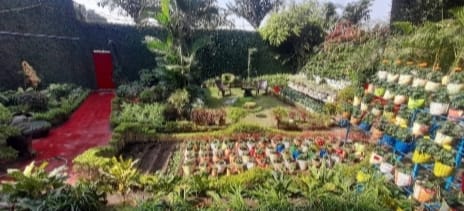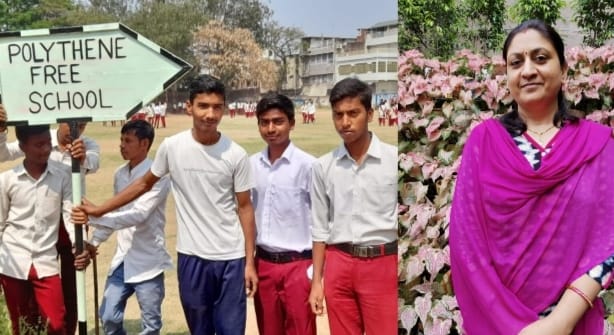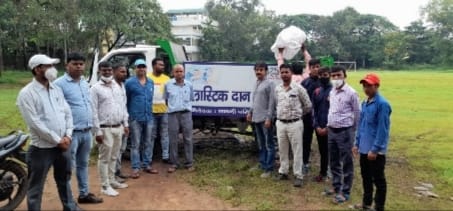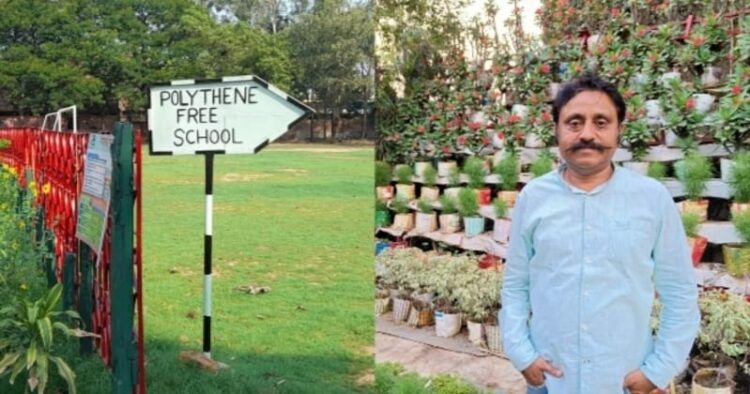Just around 50 km from the State capital Ranchi, a school teacher in his late forties is doing nothing short of a miracle to protect mother earth from the ill effects of plastic. Upendra Pandey (48) is just a private tutor who has not only succeeded in creating a 10000 sq feet plastic-free zone with the virtue of his commitment towards a plastic-free environment, but he is also inspiring others to join the noble cause.
Upendra Pandey, who lives with his wife in the district headquarters of Ramgarh, has been tirelessly working towards making a plastic-free Ramgarh for the last nine years. The couple, who, along with their noble endeavour, runs an educational institute to earn their livelihood, puts up 4-5 hours of work in their nursery to grow more saplings and collect plastic waste daily.
Recalling his inspiring journey of almost a decade, Upendra Pandey vividly recalls that it was in the year 2014 when Prime Minister Narendra Modi pledged to clean the country through his flagship ‘Swachh Bharat’ programme and appealed to the citizens to contribute. It was the appeal that inspired him to join the cause and to do something concrete.
Coincidentally, Upendra Pandey, with his wife, also visited the national capital in late 2013 and was deeply moved by the air quality and environment of the country’s capital. Upendra Pandey said it was then only he and his wife Satwinder Pandey (Sona) decided to devote their life towards environment conservation. Soon after returning from Delhi, the couple started an unique scheme for the locals of Ramgarh. The couple met with the locals, asked them to donate some plastics, and provided them with saplings.
Upendra Pandey said, ” initially, we tried to make people aware about the menace of plastic bags, but that didn’t work as expected, so we decided to make the deal more lucrative.” When asked about the cost of saplings that they distribute for free, Upendra Pandey said, “Initially, we had to buy saplings, and it did cost us some money, but soon we developed our own nursery and started donating saplings from there”.

Explaining about the initiative, Upendra Pandey says, “the very idea behind the scheme is to motivate more and more people to understand the menace of plastic. For instance, it is as simple as the quantity of plastic bags one can donate to us, we have a variety of saplings, from small indoor plants to fruit-bearing trees, but even if anyone comes to us without plastic bags but still need a sapling for a good cause, they are more than welcomed.”
Talking about the awareness spread through his initiative, Upendra Pandey said: “that he, along with his wife Shona, had launched the scheme almost a decade ago, and now we have come a long way. Initially, it was confined to our neighbourhood, but now we have been working with many schools as well.”

“The Model High School of Ramgarh has also been transformed through the scheme. We have worked hard along with the staff of the school to make it a polythene-free school. We have planted a number of trees in the school premises, and that needs to be done at every Government or any other institution”, quoted Upendra Pandey further.
Though amid the tireless work that the couple put in to run their noble endeavor, they wish that a polythene recycling park should be established in the nearby region. The idea behind the park is that the locals not only can easily donate plastic bags directly to the recycling centre but also learn about the importance of its recycling.
“All we wish is that a polythene park should be set up in the area, and the Prime Minister should give a thought about implementing the scheme on a large scale as it will not only help in disposing of thousands of tons of plastic bags to recycle but will surely help in combating the ever-growing threat of global warming”, concluded Upendra Pandey.

It is to be noted that according to a report of the Marico Innovation Foundation titled ‘Plastics, The Potential and Possibilities’, India produces around 3.4 million tonnes of plastic waste in a year. The report, which has been prepared in association with the Indian Institute of Science (IISc) and Praxis Global Alliance, also revealed that only 30per cent of the generated waste gets to the recycling centres.
When not recycled or disposed of in a controlled manner, discarded plastic waste generates GHG (GreenHouse Gases) emissions when exposed to radiation (solar) both in the air and water. According to another estimated figure, around 18 million tons of plastics originating from South Asia are mismanaged and, consequently, are washed into the ocean.
The mismanaged plastic on the ocean floor contributes to climate change by further breaking down into microplastics and emitting methane and ethylene when exposed to sunlight. It also badly affects the ocean organism, which again indirectly contributes to the climate change.
In such a scenario today, the growing threat of global warming is contributing decisively to climate change and claiming many lives annually. It is of utmost priority to not only spread awareness about the menace of mismanaged plastic bags to the environment, but it’s also high time that the noble initiatives run by citizens like Upendra Pandey should be lauded with an open heart.


















Comments